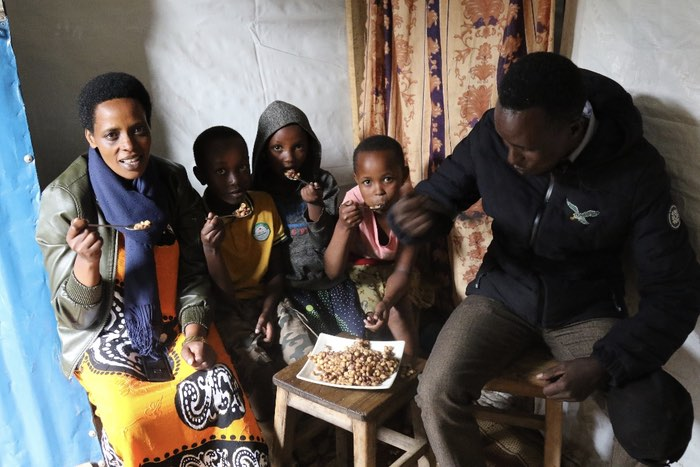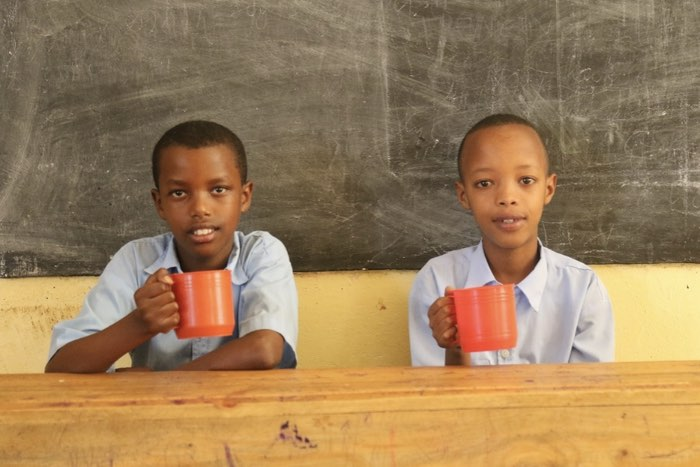
The Karamira family sharing lunch in their house located in the middle of the Nkamira transit center. Photo: WFP/Raissa Iradukunda
By John Paul SESONGA
The Karamira family has known more upheaval in their lives than most. Now, as asylum seekers in Nkamira transit center in western Rwanda, their story has become one of perseverance, despite the repeated nature of the conflicts in Eastern Democratic Republic of Congo (DRC) that had uprooted them time and again. Thanks to Japan’s funding, which enables food and nutrition assistance for thousands of refugees, returnees, and asylum seekers in Rwanda, the Karamiras manage to survive another day.
Jean-Baptiste Karamira, 38, and his wife Jeannette Karakowe, 30, had a love story that defied the odds of the conflicts. They were married in June 2013 in Rutsuru, within the Bishusha groupement of Eastern DRC. Their journey as a family was marked by love and hope, often overshadowed by the violence that plagued their homeland.
Jean-Baptiste was only 11 years old in 1996 when his family fled to Rwanda for the first time, seeking refuge in the Kiziba camp. Jeannette, then just 7, found herself in the Gihembe camp. Jean-Baptiste and Jeannette returned to DRC in 2002 when a fragile peace allowed them to rebuild their lives.
In 2007, Jean-Baptiste and Jeannette met at the secondary school Institut Kazihiro in Rutsuru, both pursuing their education with determination. They graduated in 2012, and their union the following year was a testament to their shared dreams. Peace seemed to prevail, and they engaged themselves in farming beans, maize, and potatoes, finding joy in the simple pleasures of life. Both became teachers—Jean-Baptiste teaching history at Institut Kazihiro and Jeannette at Bukinanyana Primary School. They dreamed of buying more land and continuing their education at university.
However, their peaceful existence was shattered in May 2016. An armed conflict erupted again in the nearby Bukombo groupement, and Jean-Baptiste’s friends warned him that he was in danger due to his ethnicity. Reluctantly, he resigned from his job, knowing that his safety was paramount. By November 2017, open war had broken out. Armed men raided their village, seizing their livestock and leaving them with no choice but to flee.
The Karamiras’ escape was terrifying. They navigated dangerous armed roadblocks through Bambino, Tebero, and Kurugi, eventually passing through Tongo and Karengera. In December 2017, they found temporary safety in Uganda, staying at the Nyakabande transit center. From there, they moved to Cyaka, where they lived from 2018 to 2021. The desire to return home was strong, and in 2021, they made their way back to Congo, hoping for a better future.
Yet, the promise of peace was short-lived. In 2023, war erupted once more, forcing the Karamiras to flee to Rwanda again. This time, they found themselves at the Nkamira transit center. Jeannette had escaped with their children first, and Jean-Baptiste joined them a month later, in October 2023. This marked the third time they had been uprooted, with no hope of returning home in sight.
Despite the hardships, the Karamiras remained resilient. They are grateful for the World Food Programme’s (WFP) food and nutrition support they receive at the Nkamira transit center, where Japan’s funding ensures that the basic necessities of thousands of asylum seekers are met.

Ishimwe Vanessa (L) and Shema Elyse enjoying mid-morning porridge at the primary school of the Kiziba refugee camp in western Rwanda.
Nutritious porridge contributes to children’s good health, their performance”With Japan’s funding, WFP provides in-kind food assistance to refugees at Mahama refugee camp, asylum seekers hosted at the Nkamira transit center, and Rwandan refugees returning home from neighbouring countries hosted at the Kijote transit center,” said Andrea Bagnoli, WFP representative and country director. “With these funds, WFP supplies nutritious supplements to vulnerable groups like children under 5 years, pregnant and breast-feeding women, and people living with HIV or TB. WFP also provides mid-morning porridge to both refugee and host community school children attending the same schools in camps,” he added.
Additionally, WFP also provides technical assistance and capacity strengthening to the Government of Rwanda through the Ministry in charge of Emergency Management (MINEMA) and district authorities to enhance emergency preparedness and response capacities for effective disaster risk reduction and management. Funds from Japan also enabled WFP to facilitate social and behaviour change communication activities, such as organizing cooking classes, establishing kitchen gardens, mother-to-mother support, savings groups, and livestock rearing initiatives in refugee camps.
Through WFP, the Embassy of Japan is delighted to contribute to addressing the needs of vulnerable people such as asylum seekers, refugees, host communities and those living in disaster-prone areas by providing food assistance and technical assistance for disaster risk management. Japan highly acknowledges the tireless efforts and dedications made by the Government of Rwanda and WFP in response to urgent humanitarian needs, and Japan remains committed to addressing the needs of vulnerable people. (End)
